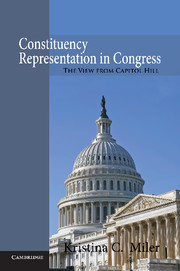Book contents
- Frontmatter
- Contents
- Acknowledgments
- 1 The Unanswered Question of Legislative Perceptions
- 2 A Dyadic Theory of Subconstituency Representation
- 3 The Psychology of Constituency Representation
- 4 Subconstituents Relevant to Health Policy and Natural Resources Policy
- 5 Explaining Legislative Perceptions
- 6 The Effects of Legislative Perception on Participation
- 7 Reassembling the District as a Whole
- 8 Perception, Reform, and Representation in Congress
- Appendix A Sampling
- Appendix B Interviews
- Appendix C Measurement of Primary Independent Variables
- Appendix D Measurement of Legislative Participation
- Appendix E Instrumental Variables Model of Legislative Participation
- References
- Index
Appendix A - Sampling
Published online by Cambridge University Press: 05 October 2010
- Frontmatter
- Contents
- Acknowledgments
- 1 The Unanswered Question of Legislative Perceptions
- 2 A Dyadic Theory of Subconstituency Representation
- 3 The Psychology of Constituency Representation
- 4 Subconstituents Relevant to Health Policy and Natural Resources Policy
- 5 Explaining Legislative Perceptions
- 6 The Effects of Legislative Perception on Participation
- 7 Reassembling the District as a Whole
- 8 Perception, Reform, and Representation in Congress
- Appendix A Sampling
- Appendix B Interviews
- Appendix C Measurement of Primary Independent Variables
- Appendix D Measurement of Legislative Participation
- Appendix E Instrumental Variables Model of Legislative Participation
- References
- Index
Summary
Eighty-one offices were selected using purposive sampling designed to create a sample representative of the 435 Members of the U.S. House of Representatives on important dimensions such as party, seniority, region, and committee membership. The sampling process was conducted for health policy and natural resources policy separately to produce two independently chosen samples of forty legislative offices interviewed within each issue area. In each issue area, legislators on the committee with primary jurisdiction were oversampled in order to create a sample with an equal number of committee members and non–committee members. Based on the composition of the full chamber and relevant committee, the forty health policy interviews and forty-one natural resources policy interviews were then allocated based on party, region, and seniority. Random sampling was used to select offices to be interviewed within the committee and non–committee groups. As a result, the sample is representative of the full committee or full House, respectively, in terms of party, seniority, and region (see Tables A1, A2, and A3). These dimensions are relevant to the sampling process because of the possibility that these features may affect the relationship between the legislative enterprise and constituents in the district. The overall effect of this process is that the sample of legislators closely mirrors the composition of the U.S. House of Representatives.
- Type
- Chapter
- Information
- Constituency Representation in CongressThe View from Capitol Hill, pp. 167 - 168Publisher: Cambridge University PressPrint publication year: 2010



